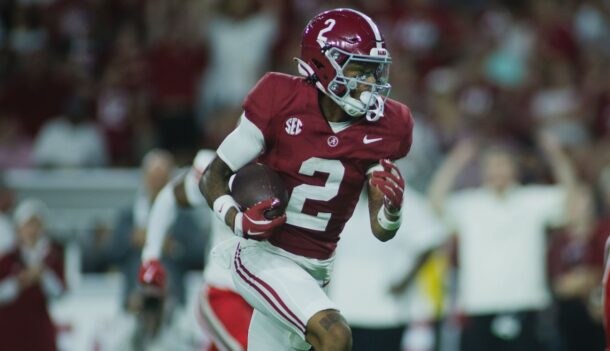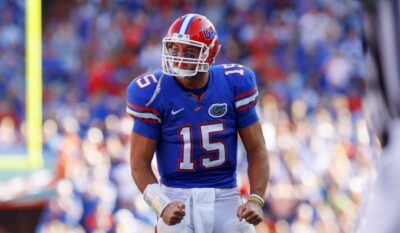What are the characteristics of an SEC championship team?
Is a stifling defense more important than a Heisman Trophy quarterback? Perhaps coaching is the most important factor, or NFL talent.
We were curious, so we studied the seven most recent SEC championship teams to search for commonalities and differences. Here’s what we found.
| Team | NFL Draft Picks* | Coaching Exp.^ | QB Yds./TDs | Rushing Rank | Def. Rank | Big Wins# |
|---|---|---|---|---|---|---|
| ’14 Alabama | 7 | 19 | 3,890/32 | No. 35 | No. 12 | 6 |
| ’13 Auburn | 4 | 2 | 2,422/20 | No. 1 | No. 87 | 4 |
| ’12 Alabama | 9 | 17 | 3,052/31 | No. 16 | No. 1 | 10 |
| ’11 LSU | 5 | 11 | 2,135/21 | No. 22 | No. 2 | 10 |
| ’10 Auburn | 4 | 4 | 3,002/31 | No. 5 | No. 60 | 5 |
| ’09 Alabama | 7 | 14 | 2,631/17 | No. 12 | No. 2 | 5 |
| ’08 Florida | 3 | 9 | 2,995/33 | No. 10 | No. 9 | 10 |
| Average | 5.6 | 10.9 | 2,875/26 | No. 14 | No. 25 | 7.1 |
*Limited to the subsequent draft
^Years as an FBS head coach, including the championship season
#Margin of 21+ points
NFL DRAFT
The average SEC championship team has produced close to six NFL draft picks immediately after winning the title.
What you can’t see in that number is how many of those picks are first-round players. It’s a high concentration of numbers. The other thing not indicated in that figure: the number of future NFL players who returned to school in the year following the championship.
For example, the ’08 Florida team produced just three players in the spring draft. That’s because Tim Tebow, Joe Haden, Maurkice Pouncey, Jermaine Cunningham, Carlos Dunlap, Brandon Spikes and three others that would get selected the following year returned to win another SEC East title.
So while it’s necessary for a team to be loaded with NFL talent to win the SEC, that talent doesn’t have to be headed to the pro level immediately after the season.
COACHING EXPERIENCE
The two Auburn teams are exceptions to several of these rules, but coaching experience is the most pronounced.
The 2014 SEC championship featured Alabama and Missouri. Nick Saban and Gary Pinkel earned FBS head coaching jobs in 1990 and 1991, respectively. That was before the institution of the first-ever SEC championship game.
Les Miles (LSU) and Urban Meyer (Florida) had a combined 20 years of head coaching experience during the time of their most recent SEC titles.
Coaching experience matters, but it’s not necessary. Back to the Tigers: Gene Chizik won a national championship in just his fourth year as an FBS head coach. Granted, he rode Heisman Trophy winner Cam Newton as a one-year wonder and only lasted two more seasons as a head coach.
Gus Malzahn won an SEC title even faster — in just his second-ever season as an FBS head coach. But Malzahn had such a prestigious history as a high school football coach and subsequently as an SEC offensive coordinator.
QB YARDS/TOUCHDOWNS
This category seems to matter the least in relation to SEC champions. The 2011 LSU team featured Jarrett Lee (1,307 passing yards) and Jordan Jefferson (737 passing yards), even while throwing to future NFL receivers Rueben Randle and Odell Beckham Jr.
Rounding the numbers, Alabama won an SEC championship throwing for 2,600 yards (’09) and 3,900 (’14).
Recent teams that didn’t throw for as many yards or touchdowns and still won SEC championships have featured great defenses, great running attacks or both.
RUSHING RANK
Before last season, the seven previous SEC champions ranked, on average, 11th in the country in rushing yards per game.
It appears that even in the SEC, though, a dominant rushing game is becoming less important. Three of the last four championship teams ranked outside the Top 15 nationally, including Alabama at No. 35 last season. That Tide team broke all sorts of school passing records — with a fifth-year senior who began his career dabbling at running back and had never started a game.
Then again, it’s still possible to run to a title in the SEC, as the ’13 Auburn team did while leading the nation in rushing yards.
DEFENSIVE RANK
If you’re of a certain age, you may remember the classic “which of these doesn’t belong” game often featured on the TV show “Sesame Street.” Let’s play it now, shall we?
Here is the national rank, in total defense, of the last seven SEC champions: No. 1, No. 2, No. 2, No. 9, No. 12, No. 60 and No. 87.
Auburn messes up our perfect narrative here again, claiming and overcoming the latter two thanks to Tre Mason’s outstanding season executing Malzahn’s read-option and Newton’s single-player dominance.
It’s not necessary to field one of the nation’s best defenses to win an SEC title. But it is highly likely that the SEC champions in any given year will play elite defense.
BIG WINS
Those two Auburn teams that gave up a ton of yards and still won SEC titles also had to escape some close games.
The ’13 Tigers team won by three touchdowns or more just four times all season, fewest among the recent SEC champions. The so-called “Team of Destiny” pulled out miracle wins late in the year against Georgia and Alabama.
The ’10 Auburn team completed an improbable Iron Bowl comeback and finished 7-0 in one-possession games. (Again, that may have had something to do with a certain Mr. Newton.)
Typically, SEC champions escape pratfalls by putting themselves in harm’s way as infrequently as possible. The average SEC title winner since ’08 wins more than seven games by at least 21 points. Blowouts help a team rest the starters, avoid stress and don’t risk the outcome.
CONCLUSIONS
There’s a basic framework involved in winning an SEC title.
The league is so competitive that, first and foremost, you must field elite personnel. Without NFL talent, it’s not going to happen. An established, experienced head coach helps, as does great defense and a standout running game. Those are all staples within SEC football.
But whereas it used to only be possible to break the mold with an extraordinary quarterback (Tim Tebow, Cam Newton), last year’s Alabama team proved that even the SEC is capable of adopting to the high-flying passing games that characterize college football in 2015.
As much as most of us love underdogs, parity still only goes so far. Teams like Mississippi State can make brief runs with the right players (Dak Prescott), but at least to this point, the realm of SEC champions remains an exclusive group populated only by the programs with the very best historical tradition.
It’ll be interesting to see if the money that’s leveling the playing field with coaching salaries and facilities will start to mean that teams outside of Alabama, Auburn, Georgia, Florida, LSU and Tennessee are capable of winning SEC championships.
An itinerant journalist, Christopher has moved between states 11 times in seven years. Formally an injury-prone Division I 800-meter specialist, he now wanders the Rockies in search of high peaks.







